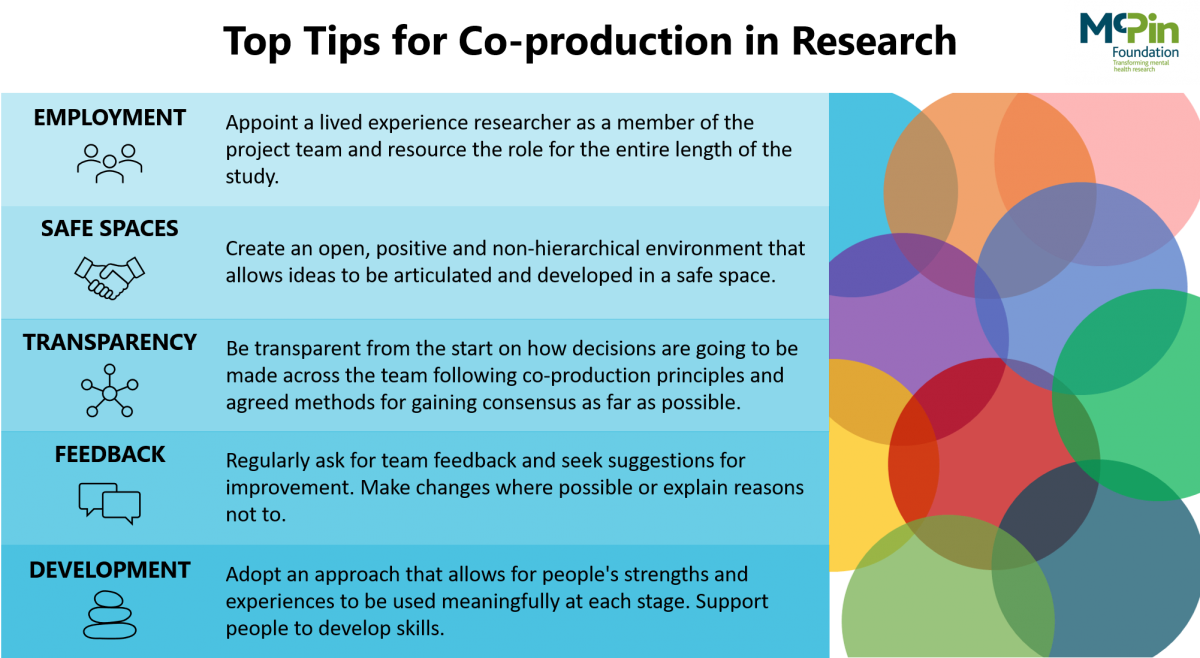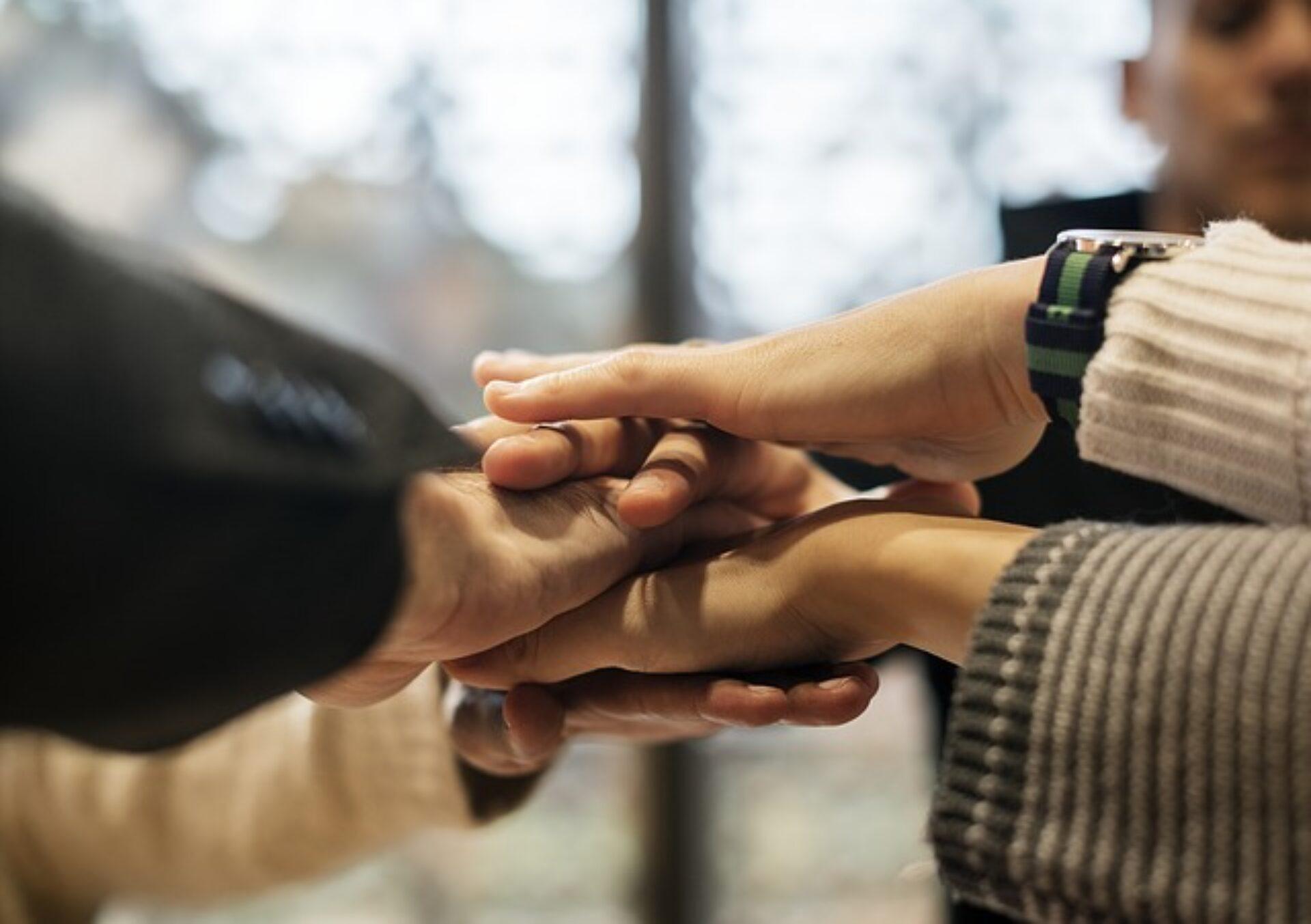Beverley, Nick and Vanessa
“Co-production” is one of those terms that has become somewhat corrupted through over-use by mainstream health services, including mental health, and then weakly applied in practice.
We are lived experience consultants and a public involvement coordinator, and we know how disappointing it is when an offer of “co-production” turns out to be mere consultation or even a tick-box exercise.
It was as exciting to find out that the Community Navigator Study was being true to the principles from the very start, as it was gratifying to reflect how fantastically well this had worked at the end. The publication of our recently released open access qualitative research paper is one part of this journey, where principles of co-production alongside peer research methods were applied throughout:
The first study paper was published earlier in the year, based on the full feasibility trial findings:
These papers present our work from a two-year study guided by the Co-production Working Group. The team consisted of service users, practitioners and researchers who drew on experiential, clinical and academic expertise with each given equal weight. People could have more than one role and have overlapping expertise.

The first six months were spent co-designing a new programme to reduce loneliness in people with depression and anxiety. Over the next 18 months, we tested it, modified it and explored it further to see if it was useful and acceptable to people.
For Vanessa at McPin, the Community Navigator study was a positive research experience using a co-production approach. And these experiences are rarely documented. The publication of the second paper provides the opportunity to share some of our learning, bringing the team back together to talk, reflect and connect even if that is only virtually.
For Nick, this project is worth talking about because it worked! It was well planned, had a purpose everyone could understand, and individuals knew how their skills could be best employed. The seamless way in which it ran allowed the serious stuff to flourish pretty much effortlessly.
Enjoyable not endurable
For Beverley, one of the key elements is to establish a non-hierarchical atmosphere so that everyone feels free to express their ideas regardless of position or job title. Saying that it is a level forum is one thing but curating the psychological safety and good-humoured rapport to actually encourage sharing is priceless.
At a time when Covid-19 has brought many new collaborations between community and statutory bodies in response to the crisis, it is a principle that should be borne in mind if these connections are to be built upon and utilised as part of an integrated community health system. This style of working actually made the meetings enjoyable rather than endurable.
For other members of the co-production group, it is worth highlighting how important it is to be able to use personal lived experience of depression, anxiety and mental health services to co-design an intervention that addressed some of the challenges and barriers they had experienced in the past.
Experiential knowledge so often gets lost in the system and this was a great opportunity to use both positive and negative experiences to create something that strived to attend to people’s individual needs.
So, what made a difference?
Writing the paper helped us reflect on how we did co-production in the Community Navigator Study, and what we learnt along the way. Here is a list of things we think helped.
- Appointed a peer researcher as a member of the project team and resourced the role for the entire length of the study.
- Discussed and agreed upon ground rules for co-production working group meetings from the beginning rather than wait until an issue cropped up.
- Were transparent from the start on how decisions were going to be made across the team following co-production principles and agreed methods for gaining consensus as far as possible.
- Created an open, positive and non-hierarchical environment that allowed ideas to be articulated and developed in a safe space, mostly in meetings but also emails and telephone calls.
- Sat at the table together, literally and metaphorically. On a practical level, this meant giving enough notice and carefully planning agendas so that everyone could make and contribute to meetings. But more importantly, everyone’s expertise (experiential, academic and clinical) was equally valued and drawn on to make decisions. This contrasts with other projects where the service user group might meet separately with their views ‘fed in’ to the decision-making group.
- Hosted several meetings in quick succession at the beginning of the project. This enabled people to get to know each other quickly and establish good working relationships, which contributed to team cohesion. This laid a good foundation for later in the project when meetings were less frequent, or tasks were completed remotely.
- Routinely asked everyone for feedback on how meetings were run and suggestions for improvement at interim points. These were incorporated where possible.
- Were open to adapting our processes where needed but discussed this with the whole group first.
- Ensured that the work was well organised, with roles and tasks carefully clarified.
- Adopted an approach to the work that allowed for different people’s strengths and experiences to be used meaningfully at each stage.
- Ensured there were opportunities to contribute in several ways and supported people to develop their strengths and skills. These included qualitative interview analysis, training the community navigators who worked on the study, writing up the final report, speaking at events, and producing blogs.
- Ensured sufficient resources were available for all involvement tasks, paid at a value reflecting their worth.
We feel that putting time and effort into co-production is a good investment. Our Co-production Working Group shaped the study – all members left an impact. This was equally true for shaping the Community Navigators intervention itself and in writing up the papers for publication.
In our most recent paper we discussed how to visually represent our findings: the final diagram was a team effort and it was good to get positive reviewer feedback on that particular aspect of our work.
We would like to encourage more co-produced research. You do not need to have the whole co-production process strictly mapped out at the start for it is a journey of discovery. A firm framework but with spaces for creativity will help research projects get the most out of co-production. Remember, it’s not just consultation, it is co-creation. May the future be fertile!
“I share the really positive experience of co-production described here. All through, it felt like we were doing research with the co-production group, not consulting them about it. I think that central principle was key. McPin, as involvement specialists, did more than just provide experience in how to organise co-production: they held the whole study team to account and ensured co-production remained a central focus at all stages.
“The co-production group model, rather than having a separate lived experience study group, was new to me. I feared it might mean some voices got lost. Instead, it served to break down barriers, ensured all perspectives were fully heard, and allowed everyone to share all their relevant experience, whatever perspective they primarily brought to the group.
“Perhaps especially with research about developing new ways of working, lived experience and practice experience are crucial: I’m really grateful to all involved that we got that on Community Navigators, and the study was much the stronger for it” – Dr Brynmor Lloyd-Evans, UCL. Study co-lead.

